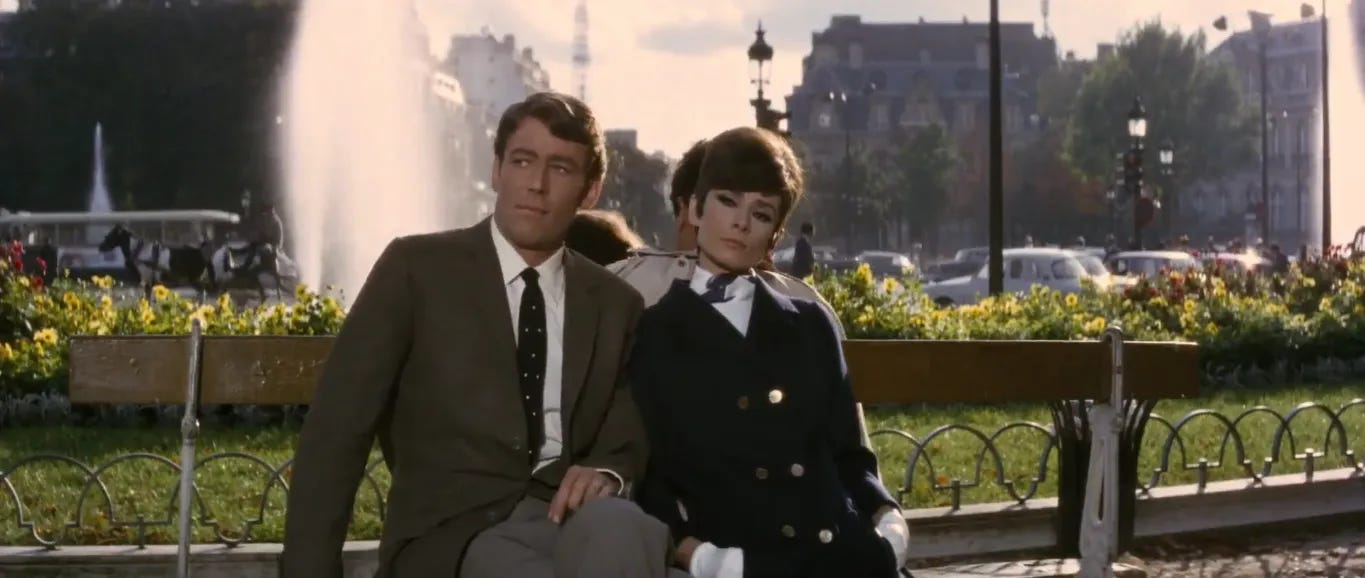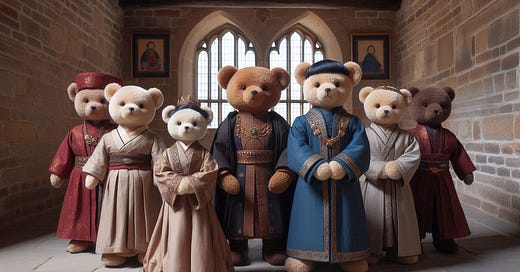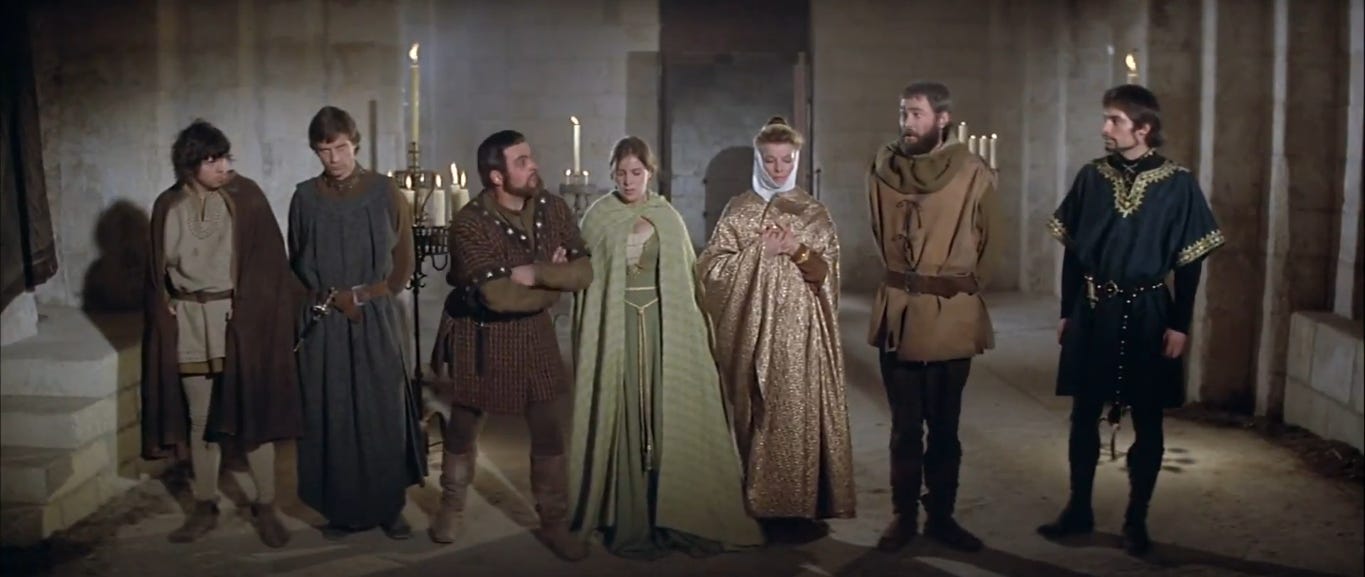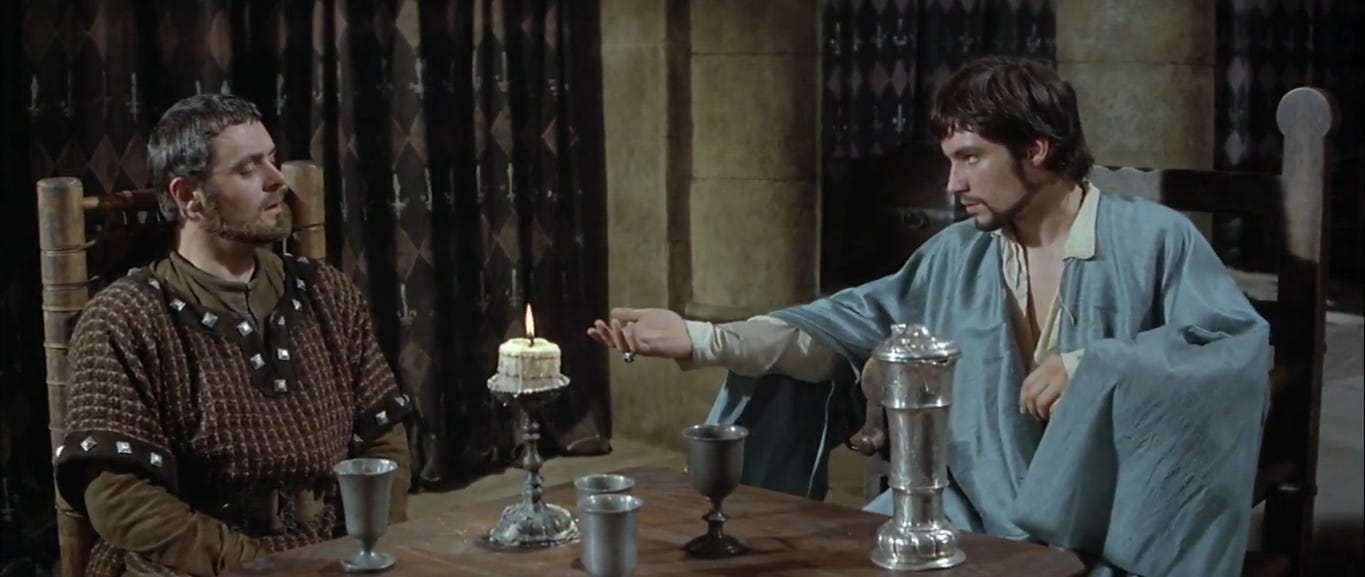Remember Becket, where we watched Peter O’Toole play a young, impetuous Henry II? Well, Peter O’Toole’s back in this spiritual sequel as an older and cannier—but still impetuous—Henry II.
Besides Henry, the film focuses on six other historical figures:
Eleanor of Aquitaine (Katharine Hepburn), Henry’s wife—and the former wife of the previous French king, Louis VII.
Eleanor and Henry’s three kids: Richard the Lionheart (Anthony Hopkins), Geoffrey (John Castle), and John (Nigel Terry).
Philip II (Timothy Dalton), king of France and son of Louis VII.
Alais (Jane Merrow), daughter of Louis VII. She’s engaged to Richard but is sleeping with Henry.
Eleanor has been imprisoned by hubby Henry for supporting a previous rebellion against him. She’s been temporarily released to celebrate Christmas with the fam, but she uses that time to further her Machiavellian plot. Y’see, she wants Richard to be king next while Henry wants John as heir. Meanwhile, all three sons are jockeying to seize the crown right now. But honestly? It’s not all that interesting.
Rating: 6/10, I didn’t really like “Succession” either.
Cast and Crew
Between Becket and this film, Peter O’Toole flexed his comedic chops in What’s New, Pussycat? (1965) and How to Steal a Million (1966). He’ll be back in the column real soon.

Quick Hits:
The Lion in Winter was based on a play, and both the play and the film were written by James Goldman. James also wrote the book for the 1971 Sondheim musical “Follies” and the screenplay for Nicholas and Alexandra (1971), but it’s his brother William who’s the famous Goldman. We’ll see one of Will’s screenplays soon enough.
This was Welsh actor Anthony Hopkins’ first major film role. A young Anthony Hopkins! Neat. We’ll see him in many major roles, though, like, not for a while.
The not-Welsh-but-born-there Timothy Dalton had his film debut here. Dalton’s
my favorite James Bond actorthe James Bond I tell people is my favorite Bond when I’m being difficult. The Living Daylights (1987) is really good, though.
The Trivia, Part I: Katharine Hepburn, 1932–1950
Here are some contemporary quotes about Katharine Hepburn from the beginning of her career:
“She looks a fright, her manner is objectionable, and she has no talent.”
“She runs the gamut of emotions from A to B.”
“She might be better at high hurdles than at acting.”
“Box office poison.”
Yeah, that’s about Katharine Hepburn, the actress voted greatest female star of classic Hollywood cinema. But at the beginning of her career, when Hepburn was working on her first film, even her agent was dropping zingers: he said, “My God, are we sticking [the studio] $1,500 a week for this?!” And yes, even RKO head David O. Selznick thought they were taking a risk on Hepburn, but director George Cukor liked her: “[she] was this odd creature unlike anybody I'd ever heard.” Together, they made A Bill of Divorcement (1932), and a star was born.

The next year, Hepburn starred in Cukor’s Little Women playing the spirited tomboy Jo (not much of a stretch for Hepburn). She also won an Oscar for Morning Glory playing the spirited tomboy who becomes an actress1 (somehow even less of a stretch).

Her next Oscar nomination was for Alice Adams (1935), a film based on a Booth Tarkington novel.2 But fortunes change fast in Hollywood, and many of Hepburn’s next films flopped—including the now-considered-classic screwball comedy Bringing Up Baby (1938). So Hepburn took matters into her own hands: she purchased the film rights to a play about a strong-willed socialite on her wedding day, cast herself as the lead, chose her director (Cukor) and co-stars (Jimmy Stewart and Bringing Up Baby lead Cary Grant). The result was The Philadelphia Story (1940), a huge hit that restored her image.
Hepburn kept picking winners: she chose Spencer Tracy and Alice Adams director George Stevens for Woman of the Year (1942), a comedy that scored her a fourth Oscar nomination. She made five more movies with Tracy in the ‘40s3 and started a 27-year affair with him.4 Another ‘40s Hepburn highlight was the Song of Love (1947), about a love triangle between composer Clara Schumann, her husband Robert, and Robert’s pupil Johannes Brahms.
We started this column with movies from 1950, and for basically every Wrap-Up, we’ve mentioned ol’ Kate.5 We’re also not done with her: she’ll be back in this column for a film from 1981.
The Trivia, Part II: Henry II and Eleanor of Aquitaine
BLUF:
Eleanor of Aquitaine: A near-mythical figure who was Queen Consort twice over (first with French king Louis VII, then with English king Henry II). Mother of Richard the Lionheart and John, both who became King of England.
Henry II6: that dude who killed Thomas Becket that one time.
Eleanor of Aquitaine has been described as “a creature of legend and romance, but not history,” as if that’s a bad thing. We here at KW/OU follow the dictum from The Man Who Shot Liberty Valance: “When the legend becomes fact, print the legend.”
Eleanor mattered because, as a child, she inherited lordship of Aquitaine, a powerful duchy that pledged only nominal allegiance to France. This made her desirable: any man who married7 her would, as a man, obtain crucial aspects of her lordship—and, thus, wealth and power. Louis VII, soon to be the king of France, was the first to get it.
Eleanor was a girlboss Queen of France, more involved in politics than women were at the time. This included the slay queen move of going on the Second Crusade with her husband.8 Upon returning, our alpha female wanted to lean in and divorce Louis, and Louis eventually consented because of Eleanor’s inability to produce a male heir. Eleanor got her lands back and rebounded with Henry, Duke of Normandy.9
Henry became king of England soon after and Eleanor bore him tons of sons. Maybe, like, too many sons. The eldest to live to adulthood, Henry the Young, was married off to a daughter of Louis VII and was named “co-king” with Henry. You know how kids be, though—Henry the Young rebelled against his father with the support of Louis and Eleanor. Bad move: Henry the Young died of dysentery and Henry II had Eleanor imprisoned. Louis VII died and his son Philip II came to power.
This is where The Lion in Winter picks up. Three other sons of Eleanor—Richard, Geoffrey, and John—vied for power against each other and their father. Louis’ daughter Alais was supposed to marry one of the sons but Henry II was busy sleeping with her.10 I’m sure these squabbles seemed to matter lots at the time, but it all just reminds me of the poem “Ozymandias”:
“My name is Ozymandias, King of Kings:
Look on my works, ye Mighty, and despair!”
No thing beside remains. Round the decay
Of that colossal wreck, boundless and bare
The lone and level sands stretch far away.
Anyway, Henry died and Richard became king. He freed his mother from prison and gave her lots of power, especially while he was away on Crusade #3. When Richard was captured by the Holy Roman Emperor Henry VI, Eleanor raised the funds to pay his ransom. Richard died from war wounds in 1199, and because he didn’t have any heirs11, his brother John became king (after dealing with yet another succession conflict). Then Eleanor died, history continued, the lone and level sands stretched far away.
Odds and Ends
Anthony Harvey directed; we’ve seen his work as an editor in Dr. Strangelove and The Spy Who Came in from the Cold12…don’t confuse Henry II with St. Henry II, a Holy Roman emperor, or Henry II, a king of France from the 1500s…when “The Lion in Winter” opened on Broadway in 1966, it starred Robert Preston and Rosemary Harris…John Barry scored the film and won an Oscar for it; he’s best known for arranging the James Bond theme…my mother watched this and was deeply frustrated by the anachronistic Christmas trees.
CORRECTION: In last week’s post on The Fixer, we mentioned that Ian Holm played the android in Blade Runner (1982). WRONG. He played the android in a different Ridley Scott film: Alien (1979). We regret the error and thank the ever-vigilant Yogesh for the catch.
Hepburn would play a similar role in Stage Door (1937), a film nominated for Best Picture that was based on the Edna Ferber and George S. Kaufman play about actress roommates. I didn’t care for the play.
Tarkington’s name shows up on the list of authors who have won the Pulitzer Prize for Fiction twice (alongside William Faulkner, John Updike, and Colson Whitehead). Tarkington won for “Alice Adams” & “The Magnificent Ambersons”; the latter was filmed as Orson Welles’ follow-up to Citizen Kane (1941).
Keeper of the Flame (1942), Without Love (1945), The Sea of Grass (1947, a Western directed by Elia Kazan), State of the Union (1948), and Adam’s Rib (1949, about married lawyers arguing a case against each other).
Besides Tracy, Hepburn also had a serious relationship with Howard Hughes. We’ve mentioned the chatter that Hepburn was a lesbian (besides a brief early marriage, she spent most of her life single), but that’s chatter. When we get to talking about Eleanor of Aquitaine, we’ll see even more chatter.
Between 1951 and 1968, she made ten movies. She was nominated for Best Actress for seven of them. We’ve watched three (The African Queen, Guess Who’s Coming to Dinner?, and this). The other four: Summertime (1955); The Rainmaker (1956); Suddenly, Last Summer (1959); and Long Day’s Journey into Night (1962).
Reminder: Henry II was the first Angevin king (the word comes from “Anjou”) and also began the rule of the House of Plantagenet. Henry II’s rule was wide: he was king of England, duke of Normandy, count of Anjou, and (through his marriage with Eleanor), duke of Aquitaine.
Well, we say “marry,” but she was actually in danger of being kidnapped, raped, and forced into marriage.
Okay, real quick: the First Crusade (1096–1099) captured parts of the Holy Land and established four Crusader States (also called Outremer). The Second Crusade happened because Zengi and the Saracen Turks captured Edessa, weakening the other states of Antioch, Tripoli and Jerusalem. Also, the Prince of Antioch was Eleanor’s uncle. (While Eleanor was there, there were rumors of incest between the two, as well as rumors of an affair between her and a Saracen.)
She was rumored to have previously had an affair with Henry while married to Louis. She was also rumored to have had an affair with Geoffrey Plantagenet, Count of Anjou—Henry II’s father. Oh, also, Eleanor was rumored to have murdered Rosamund Clifford, a lover of Henry’s.
Don’t worry, this wasn’t a Woody Allen situation where he was messing around with his stepdaughter. Neither Alais nor Philip II were Louis’ children with Eleanor; instead, Alais was with Louis’ second wife and Philip was with his third wife.
There’s speculation that Richard was gay. It’s a plot point in The Lion in Winter—Richard and Philip were said to have been lovers.
Stanley Kubrick, whose Dr. Strangelove and Lolita Harvey edited, told Harvey, “You'd better hurry up and direct, then you won’t be so annoying in the cutting rooms.”






I'd love to hear more of your thoughts on the movie itself!
BTW The James Bond theme has always been credited to Monty Norman. While many sources attribute it to John Barry, and IIRC Barry did claim to have composed it, it's worth noting that Norman has always triumphed in legal actions, likely because he could show that the core melody occurs in a previous song that he wrote for a never-produced musical version of "A House for Mr Biswas."